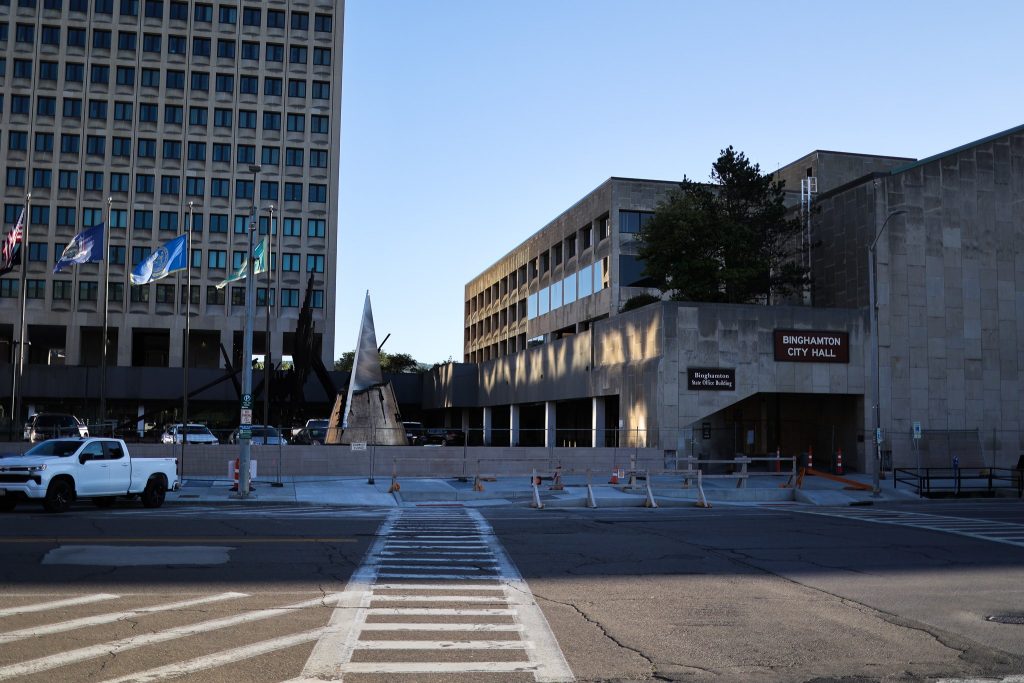As debates over housing policy in Binghamton continue, efforts to pass a local Good Cause Eviction law have drawn controversy over the past few weeks.
Intended to protect tenants from unreasonable evictions, the law was first introduced by City Councilmember Nate Hotchkiss ‘12, a Democrat representing the fourth district, in early December. Since then, it has received mixed feedback from local groups and political figures.
Community groups like the Binghamton Tenants Union and Citizen Action of New York have expressed support, while the Greater Binghamton Chamber of Commerce has opposed it. Mayor Jared Kraham, a Republican, has yet to formally endorse or oppose the law but has urged the City Council to take additional time before moving to a vote.
“Good Cause Eviction will increase housing stability, combat unreasonable rent increases, and protect tenants from retaliatory unjust evictions,” Hotchkiss said in a Dec. 2 press release. “It’s critical that we utilize all the legislative tools at our disposal to combat the housing crisis and create stability in neighborhoods.”
Originally scheduled for the evening of Dec. 18, the vote was pushed back, likely to some time this month, Hotchkiss said in a Dec. 17 interview with Pipe Dream. He said the council had already planned to reschedule the vote before Kraham’s call to delay it.
“Rushing these regulations through, I believe, would be a mistake — one that could have serious consequences for our neighborhoods, the people who live, work, rent and own property in Binghamton,” Kraham said at a Dec. 17 press conference. “I am urging City Council simply to press pause, dig more deeply into this issue and provide stakeholders with more time to weigh in and give the measures the time and consideration that Binghamton residents deserve.”
After its initial passing in New York’s 2025 budget, the Good Cause Eviction law took effect in New York City in April 2024, and municipalities may opt-in to the law through their local legislative bodies. Under the law, landlords can still evict tenants for “good cause,” including neglecting to pay reasonable rent or using the property for illegal activities.
Hotchkiss told Pipe Dream that Binghamton’s proposed law protects tenants against retaliatory evictions and allows for lease renewals assuming the individual is up to date on payments and has not violated the lease. New York’s version of Good Cause Eviction allows for rent hikes of over 10 percent or the Consumer Price Index-plus-5-percent to be challenged, which according to WSKG, would mean rent increases above 8.45 percent in Binghamton.
There are some situations where the protections do not apply, Hotchkiss added, like owner-occupied buildings under 12 units or if a building is less than 30 years old. He said the law does not intend to discourage new developments, as their rents can be increased at any time. If a property is in the luxury-rent category, or over 345 percent of its fair market rate, the protections also do not apply.
While Hotchkiss said the majority of the City Council backs the legislation, the body’s sole Republican at the time, Michael Kosty, expressed opposition, saying “the government has no business controlling the cost of rent.” Kosty has since been replaced on the council by Democrat Rebecca Rathmell, a housing justice consultant who won a special election in November.
In an email obtained by Pipe Dream, the Chamber of Commerce outlined concerns with the law, including “serious unintended consequences.” Municipalities that implemented similar legislation in states like Minnesota, the chamber added, reported a drop in building permits by 80 percent, with builders and investors stopping housing projects.
This appears to refer to data about a 2021 “Rent Stabilization Ordinance” ballot measure passed in St. Paul, Minnesota limiting monthly rent increases to 3 percent in any 12-month period with no exceptions for new housing. This data was released about three months after the measure’s passage and amendments have since been adopted. Historically, and in Binghamton’s case, rent-control policies have applied only to older buildings.
The chamber asserted difficulties of New York’s business climate that adversely impact the ability of communities to attract and retain businesses.
“Furthermore, we are concerned that without a multi-year evaluation of other municipalities that have adopted this legislation, we are entering uncharted territory, that may have devastating impacts on the local housing market for years to come,” the chamber’s email reads.
The passage of Good Cause Eviction could be another step in the fight to address the local housing crisis. In August, the City Council approved legislation amending the Human Rights Law to include the “unhoused” as a protected class. In late October, community members held a rally and encampment for housing justice.
In response to the chamber’s opposition to the legislation, the Binghamton Tenants Union released a statement supporting the law. They said the chamber’s concern for property owners and landlords fails to recognize the essential role tenants play in the local workforce.
“By opposing this law, the Chamber signals an alignment with exploitative practices that undermine community well-being rather than fostering a balanced approach that benefits all stakeholders,” the Union wrote in a press release. “Touting philanthropic and charitable initiatives while failing to promote policies that address the root causes underlying these same issues is short-sighted. To oppose Good Cause Eviction law is to encourage practices which lead directly to increases in homelessness and chronic housing insecurity.”



